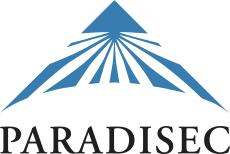Since its commencement in 2003 PARADISEC has digitised thousands of hours of analog audio, mainly financed by grants of various kinds, but also patching together funding from various sources to cover the work done for unfunded collections. In 2014, following a sharp increase in demand for digitisation and archival services, and in collaboration with the international network DELAMAN we are asking any grant writers who want to archive with us to include an allowance for that purpose. For example, the National Science Foundation says “Many of the costs associated with data management are generally eligible for funding and may be included in the budget of a proposal“. 8% of a grant costing could be considered, but this can be limited in the case of a large grant, and can be negotiated. Any contribution helps to maintain the PARADISEC service.
We encourage you to include archiving costs in your funding applications. Documentation of small and endangered languages must include the provision for safe longterm storage of the data. While digital data requires less handling and processing than do analog tapes , there is still a cost involved in managing incoming collections and ensuring their integrity and accessibility over time.
Any donation you can make will assist with running the collection. The sheer size of the PARADISEC collection and the commitment by the large team of researchers running it makes it a trustworthy repository. But the cost of preparing the data and digitising analog tapes needs to be recouped from depositors who can afford to pay for it.
The following table gives notional costs (in Australian dollars) for processing tapes and digitising their content into a secure repository. Metadata entry conforming to the OLAC Metadata standard is included as a cost, and assumes that the depositor has provided basic information as outlined in the PARADISEC metadata statement. The cost of returning tapes and CDs to the depositor is also included in the table below. These costs are provided for inclusion in funding applications. Quotes can be provided for large jobs.
Video costs us around AUD$20 per file to transcode to archival formats and so we ask for a contribution from depositors to cover this cost. Transfer from physical media (e.g. mini-DV tapes) will cost extra.
|
Condition of tape |
|||
|
Item |
Very poor (e.g. visible mould, tape breaking up) |
Poor (e.g. some mould) |
Clean |
|
Preparing tape |
e.g. 3 weeks’ baking in vacuum oven $150 |
Cleaning tape $80 |
– |
|
Digitisation |
$170* per hour |
||
|
Returning tape to depositor |
Postage/courier costs |
||
|
Returning CD to depositor (data/audio) |
Postage/courier costs |
||
|
Metadata entry |
If provided in electronic format as delimited text by depositor $10 per tape. If provided on paper (e.g. on tape boxes) $30 per tape. |
||
| Carrier for data return | Cost of hard disk or USB stick | ||
Cost of archiving digital media
|
DAT |
Minidisk |
CD ROM |
Hard disk |
|
Realtime costs ($170 per hour) |
Realtime costs ($170 per hour) Textual track reading is an additional cost. |
To find out more or to enquire about our fees for digitisation and CD production, please email us.
